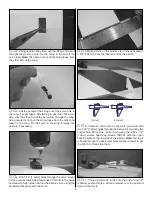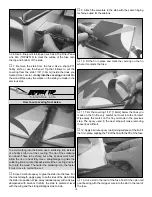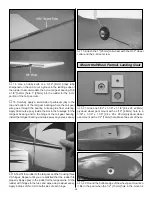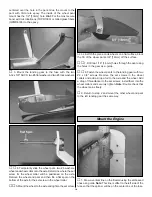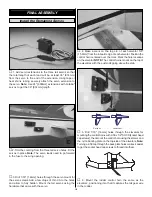
❏
Hook & Loop Velcro
®
(GPMQ4480)
❏
3' Medium fuel tubing (GPMQ4131)
❏
Easy Fueler
™
fuel filling valve for glow fuel (GPMQ4160)
❏
Handy Mounts air valve, fuel filler mounts (GPMQ6000)
❏
Top Flite
®
Trim seal tool (TOPR2200)
❏
Top Flite Sealing iron (TOPR2100)
❏
Top Flite Hot Sock
™
iron cover (TOPR2175)
In addition to common household tools and hobby tools, this
is the “short list” of the most important items required to build
the U-CAN-DO 3D .46 ARF.
Great Planes Pro
™
CA and
Epoxy glues are recommended.
❏
1/2 oz. Thin Pro CA (GPMR6001)
❏
1/2 oz. Medium Pro CA+ (GPMR6007)
❏
6-Minute Epoxy (GPMR6045)
❏
30-Minute Epoxy (GPMR6047)
❏
Small T-pins (HCAR5100)
❏
Electric drill
❏
Drill bit set including (1/16" 3/32" 1/8" 5/64" and 1/2" bits)
❏
Small Phillips and flat blade screwdrivers (HCAR1040)
❏
Pliers with wire cutter (HCAR0630)
❏
Standard Hex wrench set (HCAR0520)
Here is a list of optional tools mentioned in the manual that
will help you build the U-CAN-DO 3D .46 ARF.
❏
Great Planes CG Machine
™
(GPMR2400)
❏
Top Flite
®
Precision Magnetic Prop Balancer
™
(TOPQ5700)
❏
Straightedge with scale (HCAR0475)
❏
Cutting mat (HCAR0456)
❏
Masking Tape (TOPR8018)
❏
CA Applicator Tips (GPMR6033)
❏
CA Debonder (GPMR6039)
❏
CA Accelerator (GPMR6034)
❏
Milled Fiberglass (GPMR6165)
❏
Microballoons (TOPR1090)
❏
R/C-56 Canopy Glue (JOZR5007)
❏
Epoxy Brushes (GPMR8060)
❏
Mixing Sticks (GPMR8055)
❏
Threadlocker (GPMR6060)
❏
Denatured Alcohol (for epoxy clean up)
❏
Hobby Knife (HCAR0105), #11 Blades (HCAR0211)
❏
Non-elastic monofilament or Kevlar fishing line for stab
alignment (K+SR4575)
❏
Builders Triangle Set (HCAR0480) (for fin alignment)
❏
Easy-Touch
™
Bar Sander (GPMR6170, or similar)
❏
Felt-Tip Marker (TOPQ2510)
❏
Small metal file
❏
Rotary tool such as Dremel
®
❏
Rotary tool reinforced cut-off wheel (GPMR8200)
❏
Curved Tip Canopy Scissors for trimming plastic parts
(HCAR0667)
❏
Dead Center
™
Engine Mount Hole Locator (GPMR8130)
❏
Great Planes AccuThrow
™
Deflection Gauge (for
measuring control throws, GPMR2405)
• There are two types of screws used in this kit:
Sheet metal screws are designated by a number and a
length. For example #6 x 3/4" [19mm]
This is a number six screw that is 3/4" [19mm] long.
Machine screws are designated by a number, threads per
inch and a length. For example 4-40 x 3/4" [19mm]
This is a number four screw that is 3/4" [19mm] long
with forty threads per inch.
• When you see the term
test fit in the instructions, it
means that you should first position the part on the
assembly without using any glue, then slightly modify or
custom fit the part as necessary for the best fit.
• Whenever the term
glue is written you should rely upon
your experience to decide what type of glue to use. When a
specific type of adhesive works best for that step, the
instructions will make a recommendation.
• Whenever just
epoxy is specified you may use either 30-
minute (or 45-minute) epoxy
or 6-minute epoxy.
• Photos and sketches are placed before the step they
refer to. Frequently you can study photos in following steps
to get another view of the same parts.
• The U-CAN-DO 3D .46 ARF is factory-covered with Top
Flite MonoKote
®
film. Should repairs ever be required,
MonoKote can be patched with additional MonoKote
purchased separately. MonoKote is packaged in six-foot rolls,
but some hobby shops also sell it by the foot. If only a small
piece of MonoKote is needed for a minor patch, perhaps a
fellow modeler would give you some. MonoKote is applied
with a model airplane covering iron, but in an emergency a
regular iron could be used. A roll of MonoKote includes full
instructions for application. See page 6 for the colors used on
this model and order numbers for six foot rolls.
IMPORTANT BUILDING NOTES
Optional Supplies and Tools
Adhesives and Building Supplies
Covering Accessories
4









